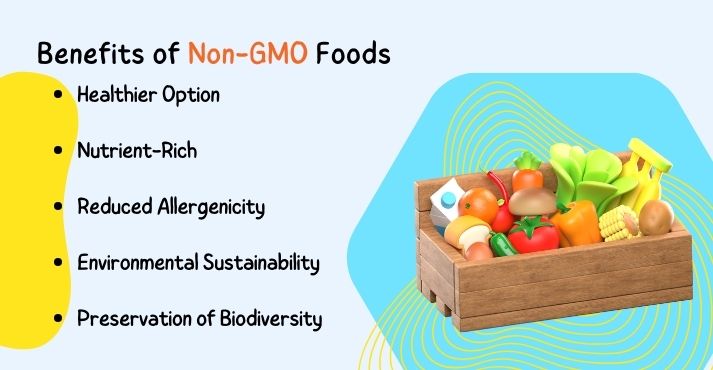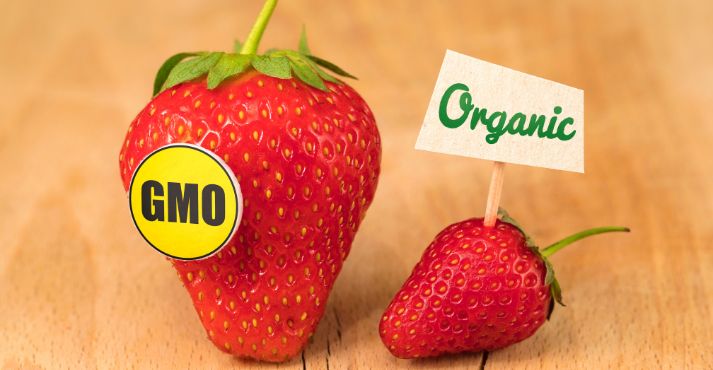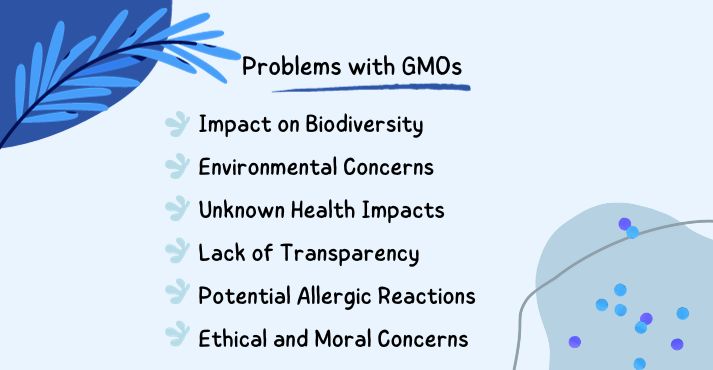As the food and beverage market evolves, consumers make their preferences known with unwavering clarity.
More people are avoiding GMO foods and buying non-GMO foods worldwide. With growing awareness and understanding of what to eat, consumers are proactively studying labels.
But the question is, what is non-GMO food? Simply put, a food product is non-GMO if no ingredients were created with genetic engineering.
According to the GlobeNewswire, the non-GMO foods market size is expected to grow from USD 302.64 billion in 2023 to USD 386.80 billion by 2028, at a CAGR of 5.03% during the forecast period (2023-2028).
The growing focus on Foodtech and the new era of Agritech has led to a rise in the demand for food products grown using non-GMO seeds, such as grains, vegetables, and fruits.
Eco-friendly, non-GMO products have developed a favorable perception among consumers, especially vegans and vegetarians, about their nutritional profile and environmental impact.
What Does “Non-GMO” Mean?
As we define non-GMO, these labels help consumers make informed choices about the food they consume.
Non-genetically modified food refers to products that do not contain genetically modified organisms. It signifies a preference for traditional breeding methods and natural selection in agriculture, addressing concerns about potential health and environmental risks associated with GMOs.
While a non-GMO label doesn’t mean organic, an organic label automatically means the product is GMO-free.
GMO foods are genetically engineered to contain genes from different species for desired traits, such as pest resistance or increased yield.
Moreover, conventional foods are grown using traditional farming practices that may involve synthetic pesticides and fertilizers but do not necessarily involve genetic modification.
Non-GMO verification and certification exist to help consumers identify the right product. USDA Organic and Non-GMO Verified are the two main seals of certification that advocate against GMO-based food products.
List of non-GMO foods
It’s essential to look for non-GMO labels or certifications when purchasing processed foods to ensure they meet non-GMO standards. Additionally, choosing organic versions of these foods can also help avoid GMOs, as organic certification prohibits the use of genetically modified organisms. Here is a list of common food items that are considered non-GMO:
- Fruits: Apples, bananas, oranges, grapes, strawberries, blueberries, watermelon, mangoes, pineapples, avocados, etc.
- Vegetables: Spinach, broccoli, carrots, cauliflower, bell peppers, tomatoes, cucumbers, potatoes, sweet potatoes, kale, lettuce, etc.
- Grains: Quinoa, rice, oats, barley, bulgur, millet, buckwheat, amaranth, etc.
- Legumes: Lentils, chickpeas, black beans, kidney beans, pinto beans, navy beans, soybeans (non-GMO), peas, etc.
- Nuts and Seeds: Almonds, walnuts, cashews, peanuts, sunflower seeds, pumpkin seeds, chia seeds, flaxseeds, sesame seeds, etc.
- Dairy Products: Milk, cheese, yogurt, butter, and other dairy products from animals not fed GMO feed or treated with synthetic hormones.
- Eggs: Eggs from chickens fed a non-GMO diet.
- Meat and Poultry: Beef, pork, chicken, turkey, and other meats from animals raised without GMO feed or synthetic hormones.
- Seafood: Wild-caught fish and seafood.
- Herbs and Spices: Basil, oregano, thyme, rosemary, cinnamon, ginger, turmeric, garlic, etc.
- Oils: Olive oil, coconut oil, avocado oil, sesame oil, sunflower oil, canola oil (non-GMO), etc.
- Sweeteners: Honey, maple syrup, agave nectar, molasses, stevia, etc.
- Beverages: Coffee, tea, herbal teas, fruit juices, coconut water, etc.
- Snacks: Popcorn, rice cakes, nuts, seeds, dried fruits, dark chocolate, etc.
- Condiments: Mustard, ketchup, mayonnaise, salsa, vinegar, soy sauce (non-GMO), etc.
Benefits of Choosing Non-GMO Foods

Choosing non-GMO means you prefer food products free from harsh chemical fertilizers and toxic pesticides. Non-GMOs maintain the characteristics and natural composition of their raw material.
Here are some of the critical benefits of choosing non-GMO foods. Let’s explore.
Healthier Option
Non-GMO foods are healthier as they are produced through natural breeding and cultivation methods, which do not involve genetic modification.
These food products eliminate the risk of ingesting animal products injected with antibiotics, keeping your immune system strong and functioning optimally.
Non-GMO foods are perceived as a choice that supports a more natural approach to agriculture and food production. Therefore, vegan and vegetarian diet followers also prefer non-GMO alternative proteins.
Nutrient-Rich
Non-GMO crops are typically grown in rich, organic soils. It often results in more nutrient-dense foods, offering higher levels of beneficial compounds. As non-GMO foods are picked fresh from the farm, your body will get complete nutritional value.
Due to their potential for increased nutritional content, consumers believe non-GMO foods support overall well-being. For those seeking wholesome nutrients in food products, non-GMO delivers them with minimally processed options.
Reduced Allergenicity
Non-GMO foods are less likely to trigger allergies, unlike genetically modified foods. GMOs may introduce foreign proteins or allergens into crops during genetic modification.
In contrast, non-GMO foods are developed through conventional breeding methods, which typically do not involve the introduction of novel proteins.
With consumers looking for allergen-free food products, non-GMO foods are a safer choice for individuals with known food allergies or sensitivities despite the need for thorough allergen testing in all food products.
Environmental Sustainability
Among all the other benefits of non-GMO consumption, they also help us achieve environmental sustainability. Non-GMO farming helps keep the soil fertile and reduces soil erosion.
Non-GMO crops often encourage more diverse, sustainable farming practices, such as crop rotation and organic farming, which enhance soil health and biodiversity and support long-term food security and environmental well-being.
Also, cultivation of non-GMO crops generally requires fewer resources and energy, contributing to lower greenhouse gas emissions.
Preservation of Biodiversity
Non-GMO farming encourages the growth of diverse crops and helps maintain genetic diversity. In contrast to GMOs, which involve cultivating a single, genetically uniform crop variety, non-GMO farming supports planting various traditional and heirloom crop varieties.
This diversity allows consumers to access a broader range of food choices by harvesting natural crops. It contributes to healthier ecosystems, reduced reliance on synthetic chemicals, and greater agricultural sustainability by fostering the growth of diverse crops and preserving genetic diversity.
Non-GMO vs. Organic: Key Differences

Non-genetically modified and organic food are related but distinct concepts. Non-GMO foods do not contain genetically modified ingredients, whereas organic foods are grown without synthetic pesticides, herbicides, or genetically modified organisms.
Non-GMOs use traditional breeding methods and natural genetic variation. Organic food uses farming practices emphasizing soil health, biodiversity, and sustainable resource management.
Organic food encompasses more than just the absence of GMOs; they also dictate environmentally friendly practices and animal welfare standards. A product can be non-GMO but not organic, as it may still be produced using conventional farming methods with synthetic chemicals.
Non-GMO and organic differ based on:
- Genetic modification
- Farming practices
Whereas non-GMO and organic overlap based on:
- Both do not contain genetically modified organisms (GMOs)
- Both prioritize the absence of synthetic pesticides and herbicides
There is a wide variety of both kinds of food products available in the market. Most commonly available organic foods include apples, spinach, eggs, and whole wheat bread. Non-GMO foods include soy milk, corn chips, tomatoes, and canola oil.
Problems with GMOs

Consumers may choose to switch to non-GMO foods for several reasons related to concerns associated with GMO food items.
One primary reason is the potential impact on human health and the environment.
While many GMO food manufacturers have undergone extensive quality assurance to ensure their products are considered safe for consumption, consumers still worry about the long-term effects of genetic modifications on human health.
They may opt for non-GMO foods to minimize perceived risks.
Let’s look into significant problems with GMOs in the food and beverage industry.
Impact on Biodiversity
It is assumed that genetically engineered modifications may affect the genetic diversity of a population through crossbreeding or uncontrolled growth. Genetic modification produces genetically modified animals, plants, and organisms.
GMO modification is directly related to biodiversity, the variability in the traits of organisms that make up an ecosystem, because diversity in DNA will inform the characteristics of the organisms that make up a population.
Environmental Concerns
The early warnings of environmentalists about the negative impacts of GMOs. Some serious environmental concerns include increased use of herbicides, increased pesticide evolution of superweeds, severe ecological, economic, and social impacts, and loss of biodiversity.
Modification can lead to the development of tolerant or resistant weeds. It could lead to erosion of diversity and pollute genes of endangered plant species.
Moreover, according to IARC, a widely used herbicide, glyphosate has been labeled a probable carcinogen by the WHO, which cited strong evidence of cancer occurring in animals.
Unknown Health Impacts
While GMOs have been on the market for several decades, the complex nature of human health and the intricate interplay of genetics, diet, and environmental factors make it challenging to draw definitive conclusions about the effects of GMO consumption over extended periods.
Many consumers express concerns about the long-term health effects of consuming genetically modified organisms (GMOs). Complex studies are being carried out independently worldwide to evaluate the health impacts of GMOs.
Some key findings from different research have showcased the following health impacts on the human body while further examination is still being conducted.
- GMO foods can trigger an allergic reaction
- GMO foods can contribute to the development of cancer by raising levels of carcinogenic substances
- Some GMOs contain changes that make them resistant to certain antibiotics
- Eating GMO food could lead to genetic changes in humans
- GMO foods might impact the liver, kidney, pancreas, and reproductive system
Consumers worry that GMOs may have unforeseen consequences on human health, and to address these concerns, regulatory agencies like the FDA closely monitor GMOs, requiring safety assessments and non-gmo labels, but the ongoing discourse highlights the need for continued research and transparency in the development and regulation of genetically modified foods.
Lack of Transparency
One of the significant issues surrounding GMOs is the need for more transparency in labeling. GMO products may need to be adequately labeled, hindering consumers’ ability to make informed choices about their food.
It’s human nature, it seems, to resist change and fear the unknown. Lack of information breeds confusion and distrust around genetic engineering and food.
People are concerned about the safety of consuming foods that contain GMOs or their byproducts. Inadequate labeling also contributes to a lack of trust in the food industry and regulatory bodies, fueling concerns about the potential long-term health effects of GMO consumption.
Potential Allergic Reactions
People are concerned about the potential of GMO food to cause allergies. When genes from one organism are introduced into another to create GMOs, new proteins may be produced, potentially triggering allergies in sensitive individuals.
Critics argue that rigorous testing and evaluation of potential allergenicity should be a fundamental part of the safety assessment process for GMOs.
According to National Geographic, genetically modified organisms and plants do not occur naturally, and there is a possible risk of unexpected allergic reactions to some GMO foods.
However, there are no tests to prove in advance that a GMO can cause potential reactions, as other food products may also result in such allergic reactions.
Ethical and Moral Concerns
Some consumers have ethical objections to genetically altering organisms, raising moral concerns about GMOs. They argue that manipulating the genetic makeup of living organisms goes against the principles of nature and raises questions about humanity’s role as stewards of the environment.
Ethical objections to GMOs extend to issues like biodiversity loss, corporate control over seed patents, and the potential for unintended consequences in the ecosystem.
These concerns highlight the complex web of moral and ethical considerations surrounding GMOs, contributing to the ongoing debate about their use and the need for transparent and responsible practices in genetic modification.
Conclusion
Now that you know what non-GMO food is, the benefits of non-GMO food, and the problems of GMOs, you must clearly understand the non-GMO market. Non-GMO foods are also more in line with traditional farming practices and promote biodiversity, which can have positive environmental effects by reducing the need for specific chemical inputs and fostering crop diversity.
On the other hand, the problems associated with GMOs must be addressed as the food science evolves. Concerns about potential health risks, environmental impacts, and the consolidation of seed patents in the hands of a few corporations have raised severe ethical and sustainability issues.
As a negative impact of GMO food products, genetic modifications can affect ecosystems and biodiversity, creating long-term problems that are not easily reversible.
Non-GMO foods provide a more natural and sustainable alternative, addressing concerns about health, the environment, and biodiversity, making them an appealing option for those who prioritize these aspects of food production and consumption.













